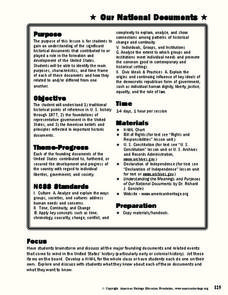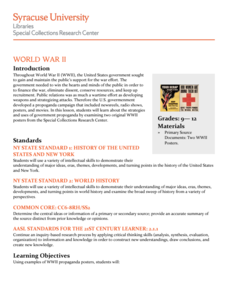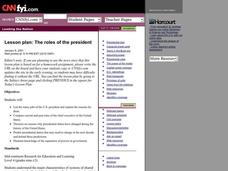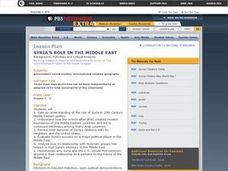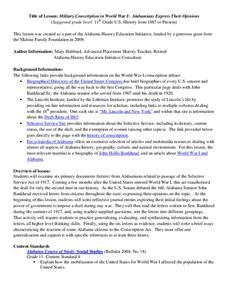Curated OER
Why Come To America?
Eighth graders investigate reasons large numbers of people immigrated to the U.S. They identify hardships and risks involved in coming to America and identify the affects immigration has had on the traditions and cultures in the...
Curated OER
The Judicial Branch
In this U.S. branches of government worksheet, students respond to 5 fill in the blank questions regarding the powers of the judicial branch of government.
Curated OER
Our National Documents
Students consider the significance of selected American documents. In this civics lesson plan, students analyze excerpts of the Declaration of Independence, the U.S. Constitution, and the Bill of Rights.
Curated OER
Different Viewpoints - Loyalist or Patriot
Third graders use primary sources to study U.S. history and government. For this primary sources lesson, 3rd graders practice gathering information from "eye witness" accounts of history.
Curated OER
POWERS OF THE PRESIDENT: THE CASE OF LATVIA
Pupils compare the powers of a U.S. president to those of leaders of other countries. They pretend they are presidential advisors and make decisions as a group as to what the president has the right do in different situations.
Curated OER
Civil Liberties and National Security
Pupils identify the civil liberties outlined in the U.S. Bill of Rights and discuss the importance of these liberties in today's society. They research examples of when Congress has taken legislative action to protect national security.
Curated OER
Forceful Persuasion
Learners investigate U.S. foreign policy in Middle Eastern countries, and rank their level of support for American military and diplomatic actions.
iCivics
The "Federal" in Federalism
How are states in the United States related to each other? Does the government bind them together? Do states have different governments? After reading about federal power as a whole group, your class members will participate in a...
Curated OER
American Focus on World Constitutions
Students describe demographic, economic, political and geographic features of the U.S., summarize events leading to the creation of the Constitution and describe the process of amending the Constitution.
Curated OER
Fugitive from Labor Cases: Henry Garnett (1850) and Moses Honner (1860)
Students engage in the comparison of cases which demonstrate the increasingly volatile political crisis in the 1850s arising over the issue of slavery and the necessity for the enactment of the 13th, 14th, and 15th Amendments to the U.S....
Curated OER
The West: US History
In this U.S. history learning exercise, students read assigned textbook pages that tell the story of Westward Expansion and respond to 35 short answer questions.
Syracuse University
World War II
During World War II propaganda was as important to the war effort as the soldiers in the field. Scholars consider how the government communicated messages of patriotism with propaganda by examining pieces from World War II. Then, they...
Curated OER
Simplified United States Constitution and Bill of Rights
A good handout is a great find. Print this resource and hand out a simplified version of the US Constitution and Bill of Rights to your US government or US history class. The powers of the president, Congress, and the Senate are...
Center for History Education
To What Extent Were Women's Contributions to World War II Industries Valued?
Women rose to the challenge when the nation's war effort called them—but were sent home when the GIs came back from World War II. Young historians consider whether the United States valued women's contributions during the war using a...
Curated OER
The Roles of the President
High schoolers list the many jobs of the U.S. president and explain the reasons for them. They compare current and past roles of the chief executive of the United States.
Curated OER
Syria's Role in the Middle East
Students hypothesize why Syria and the U.S. should find common ground in their relationship as it pertains to the future of the Middle East.
Curated OER
George Washington and the Rule of Law
students compare The rule of law with the rule of men and consider life under each of these types of governments.In this government lesson, students read a primary source to examine the importance of the rule of law.They will also answer...
Curated OER
President Wilson and the League of Nations
Learners examine Wilson's ideals of world peace and world order and the conflict between these ideals and the U.S. Senate's policy of isolationism. Wilson's visionary stance and its significance in forming the policies of our government...
Curated OER
Abolition and the Underground Railroad in Essex County
Fifth graders investigate the end of slavery and the hidden paths slaves used to travel. In this U.S. history lesson, 5th graders examine the travel routes slaves used in Essex County known as the Underground Railroad....
Curated OER
Cartoons for the Classroom: The Economic Paradox
It's a classic conundrum of economics: voters want jobs, but don't want to spend the money required for businesses to hire. This political cartoon analysis worksheet has learners analyzing this enigma and responding to 3 talking points...
Curated OER
Cartoons for the Classroom: Unemployment
It's the classic paradox in this political cartoon analysis; any jobs plan requires extra government spending. However, the unemployed aren't willing to concede to more federal spending for what they want most, jobs. Background...
Alabama Department of Archives and History
Military Conscription in World War I: Alabamians Express Their Opinions
If called, would you go? Should the US government have the power to impose a draft during any war? The Selective Service Act of 1917 (aka the Conscription Act of 1917) authorized the drafting of men into the military for only the...
Curated OER
It is Our Right-Don't Waste It!
Students explore the basic rights granted to all American citizens by the U.S. Constitution in the light of women's issues. The women's suffrage movement, the role of Susan B. Anthony, and the timeline of events on voting rights are...
National Endowment for the Humanities
Lesson 2 James Madison: The Second National Bank—Powers Not Specified in the Constitution
How much power is too much power for the federal government? Scholars use primary documents and constitutional research in groups to analyze the creation of the Second National Bank under James Madison. This is the second lesson of a...
Other popular searches
- U.s. Government Flow Chart
- Ancient Rome u.s. Government
- Ap u.s. Government
- Branches of u.s. Government
- U.s. Government Lesson Plans
- U.s. Government (Branches)
- Cuba and u.s. Government
- U.s. Government Policies
- Early u.s. Government
- U.s. Government History
- Government u.s. Constitution
- Ap u.s. Government Media




